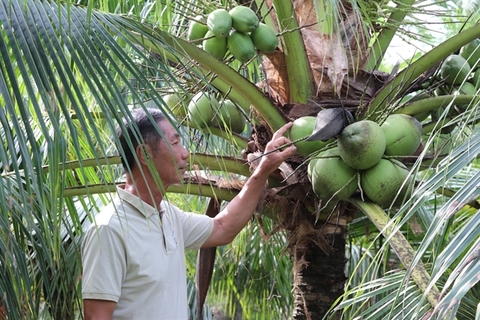
A coconut orchard in Phong Nam Commune in Ben Tre Province’s Giong Trom District. — VNA/ VNS Photo Cong Tri
Improving product competitiveness will help the Mekong Delta province of Ben Tre take full advantage of the lower tariffs to be offered under the EU–Viet Nam Free Trade Agreement (EVFTA), experts said at a seminar in the province on Friday.
Bui Thanh Son, deputy minister of Foreign Affairs, said: “Ben Tre has one of the highest development rates in the country, with advantages in tourism and agricultural exports.”
Under the EVFTA, signed on June 30 in Ha Noi, more than 99 per cent of tariffs on goods from both sides will eventually be removed over a 10-year period. The EVFTA is expected to be approved by the European Parliament early next year.
The signing of EVFTA and the EU–Viet Nam Investment Protection Agreement (EVIPA) will open up great opportunities for the two economies, Son noted.
Bilateral trade turnover between Viet Nam and the EU has maintained rapid growth, between 15 and 20 per cent per year. Total registered foreign direct investment (FDI) of EU member countries has reached US$25 billion with more than 2,200 projects.
Phan Van Mai, secretary of Ben Tre Province’s Party Committee, said that the province’s coconut, fruit and seafood were key products that could be exported to Europe.
“Ben Tre will create favourable conditions for enterprises to use scientific and technological research results in agricultural production and business,” he said.
Jean Jacques Bouflet, vice president of EuroCham in Viet Nam, urged Vietnamese businesses to make more efforts to comply with the EU market’s strict standards, which are designed to safeguard the protection of its consumers.
Traceability regulations have become especially strict, and the province must adhere to the Rules of Origin (RO) when exporting to the EU, according to Bouflet.
Food safety and hygiene standards as well as management procedures set by the EU are also important, so are corporate social responsibility and transparency of information about the labour and the production environment.
Businesses should also ensure that products meet technical standards as well as traceability, and comply with the EU's plant and animal safety and hygiene criteria, he said.
To enhance competitiveness, the province should shift to advanced production and processing systems, he added.
Fruits from Ben Tre have entered strict markets like the EU, US and Canada. Official geographical indications given by the Government to coconuts and green-skin and pink-flesh pomelos grown in the province have helped sales.
Two-way trade value between the EU and Viet Nam reached $27.45 billion in the first half of this year, a rise of 1.67 per cent over the same period last year, according to figures from Viet Nam Customs.
The EU is Viet Nam’s fourth largest trading partner and the second largest export market.
In the past 10 years, Viet Nam’s export turnover of agricultural, forestry and aquatic products grew by more than 9 per cent on average each year. Last year, it reached a record $40.02 billion.
The seminar was held by the Ministry of Foreign Affairs, Europe Business Association in Viet Nam (EuroCham), and Ben Tre Provincial Party Committee and People’s Committee. — VNS